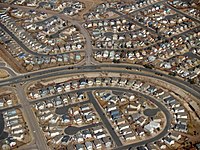
Photo from wikipedia
The Anthropocene is a much talked about epoch in the geological history of planet Earth. The impact that ‘advanced’ civilisation has had on the planet has led many scientists to… Click to show full abstract
The Anthropocene is a much talked about epoch in the geological history of planet Earth. The impact that ‘advanced’ civilisation has had on the planet has led many scientists to argue that planet Earth has now left the stable climate of the Holocene epoch and entered into a more uncertain future. Evidence for our uncertain future has been collected across a range of planetary boundaries, including climate change, ocean acidification and biodiversity loss (mass extinction) (Steffen, Grinevald, Crutzen, & McNeill, 2011; Steffen et al., 2015; Zalasiewicz, Williams, Steffen, & Crutzen, 2010). While in a narrow technical sense the Anthropocene marks a geological transition, it is also being used by critical thinkers to reconceptualise the relationship between human society and the planet (see e.g. Hamilton, Gemenne, & Bonneuil, 2015). From this critical perspective the Anthropocene is, as much as anything, a crisis in the individualistic and anthropocentric assumptions underpinning our economic and social structures (see also Brown & Timmerman, 2015). In more straight forward terms, the Anthropocene is a crisis in the way we think. Linked to this idea is the emerging realisation that humanity has much more responsibility for the health of the planet than it has traditionally assumed. Somewhat ironically, just as we are realising that we are facing a more uncertain future, one in which we cannot easily predict, manage or control, it is also clear that we need to improve the quality of our stewardship (Affifi, Blenkinsop, Humphreys, & Joldersma, 2017; Laird, 2017). And in the process of more carefully considering our interconnected natural, social and intellectual systems, it seems likely that new approaches to education need to be part of this process. New ways of thinking and new forms of education in the Anthropocene highlight the importance of educational philosophy. There is, no doubt, much that can still be developed in educational philosophy to update it in terms of the Anthropocene. Educational philosophy arguably has work to do to engage more constructively with those outside of the field. Educational philosophy could also have a greater role in inter-disciplinary work, especially work that is focused on the ‘big’ problems facing the world (Barnett, 2011; Maxwell, 2007). Educational philosophy could be an even more valuable resource when it comes to identifying and responding to the unconscious political assumptions structuring educational policy and practice. In this regard educational philosophy might also do more to challenge outdated conceptions and help construct deliberative forums for collective wisdom. Recently, a paper by Chloe Humphreys and Sean Blenkinsop in Studies in Educational Philosophy has attempted to ‘identify the extent, possibilities, and limitations of current discussions relating to the environment in the philosophy of education community’ (Humphreys & Blenkinsop, 2017, p. 244). Humphreys and Blenkinsop present their work as a way to engage educational philosophy in a larger conversation about ‘what could be’ and suggest that if others see in gaps in their work, then their efforts should be welcomed as part of a process that find a better place for educational philosophy. I for one, think that this is a discussion worth having, and in this spirit of their paper I offer the following comments on their analysis. For their part, the methodology used by Humphreys and Blenkinsop focuses on the way ‘the environment’ is discussed across five educational philosophy journals over the last 40 years (including this journal).1 They did not include any books in this review, but invite others to expand on their approach and include books in the analysis. As environmental educators, they were especially interested in examining papers that ‘address the environment in a substantive way’ (p. 244). They found very few papers
Journal Title: Educational Philosophy and Theory
Year Published: 2019
Link to full text (if available)
Share on Social Media: Sign Up to like & get
recommendations!